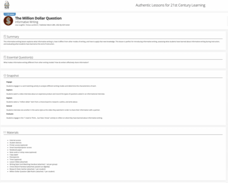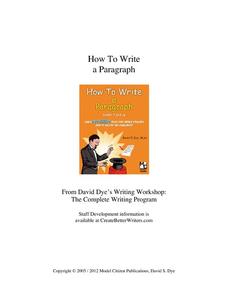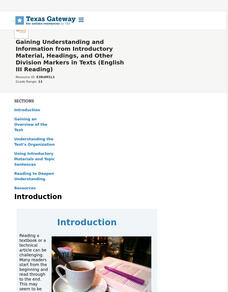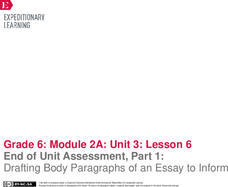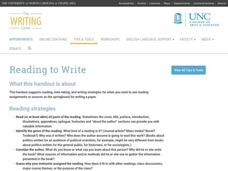EngageNY
Performance Task Preparation: Peer Critique and Mini-Lesson Addressing Common Errors: Revising Draft Essay to Inform
Time to revise! Using a writing evaluation rubric, scholars participate in a peer editing process to provide feedback on each others' informative essays. Next, pupils begin revising their drafts based on the feedback they receive.
K20 LEARN
The Million Dollar Question: Informative Writing
Introduce high school freshmen to the characteristics of informative writing with a 5-day lesson that distinguishes informative writing from other modes. Scholars learn how to search for and cite reliable resources, then research and...
Reach Out!
How to Set a Goal
Inspire scholars to reach for the stars with a handy two-page document that details why setting goals is important, how to begin the process, and three steps to set and meet goals.
EngageNY
Analyzing the Structure and Content of an Essay to Inform
Outlines are a great asset to essay planning. Scholars read and analyze a model essay about the importance of daily reading and consider how it would look in an outline format. Next, they outline their own informative essays about rules...
EngageNY
Mid-Unit 3 Assessment Part 2: Explaining How New Information Connects to the Topic
Take two! Scholars begin part two of the Mid-Unit 3 Assessment. They continue researching the destruction caused by the 1906
San Francisco earthquake and fires. To further their research, they discuss how new information connects to the...
Poetry4kids
How to Write a Diamante Poem
A lesson begins with a description of a diamante poem and the rules to follow while writing one. Scholars examine the ins and outs of synonym and antonym diamantes, then compose an original poem using their newfound knowledge.
Trinity University
Explain Yourself: An Expository Writing Unit for High School
Introduce expository writing with a unit that asks writers to craft an essay to explain a belief, value, or priority that is important to them. Mini-lessons within the unit focus on crafting thesis statements and conclusions, selecting...
K20 LEARN
Let Us Start The Lettuce Club (Or Not): Writing A Thesis Statement
Let us be frank! Writers learn that crafting a thesis statement is not that difficult if one peals back the layers. After watching several videos about the elements of a thesis, class members read the article "Lettuce Club helps students...
Massachusetts Institute of Technology
Sentence Structure of Technical Writing
Most teachers and scholars look for a way to simplify information. Informational how-to slides simplify the process of technical writing into a step-by-step process. Learners gather information on what to do, as well as what to avoid....
Model Citizen Publications
How To Write a Paragraph
Instructing learners on how to craft a good paragraph, a skill required of all writers, is the focus of a 23-page packet that includes directions, graphic organizers, exercises, and worksheets for guided practice.
EngageNY
Grade 9 ELA Module 3, Unit 3, Lesson 3
Plagiarism is the theft of intellectual property. To avoid this crime, class members learn how to create a works cited page and how to craft in-text citations. After examining a high-performance model paragraph and an example of a works...
EngageNY
End of Unit On-Demand Informational Writing: Philo Farnsworth’s Invention of the Television and How It Changed People’s Lives, Part 2
Scholars complete the unit by finishing their end of the unit assessments. They arrange sentences for an introductory paragraph in the correct order, provide evidence for their thinking, and write a conclusion paragraph. They then...
Fluence Learning
Writing About Literature: Nature in the Writings of John Muir and Emily Dickinson
As an assessment of their skill in crafting a compare and contrast essay, class members read and compare the portrayals of nature in excerpts from naturalist John Muir's My First Summer in the Sierra and from poet Emily Dickinson's "The...
Overcoming Obstacles
Writing Reports
Following a review of how to research and take notes, scholars define the term paraphrase and identify ways to organize information and finish reports. To put their newfound knowledge to the test, learners interview a peer, take notes,...
Texas Education Agency (TEA)
Gaining Understanding and Information from Introductory Material, Headings, and Other Division Markers in Texts (English III Reading)
All teachers are teachers of reading! The 13-part interactive series ends with a lesson that teaches learners (and their instructors) how to approach reading their textbooks. After learning about several strategies, users test their...
EngageNY
End of Unit Assessment, Part 1: Drafting Body Paragraphs of an Essay to Inform
Anybody can write a body paragraph! Pupils analyze the development of ideas in a body paragraph from a model essay. Next, using what they've learned, they draft the body paragraphs of their My Rule to Live By informative essay.
EngageNY
How to Write Like a Scientist in the Field: Introduction to the Elements of Field Journals
It's time to start journaling. Scholars look at examples of science field journals. They work in pairs to examine and complete a note catcher about a field journal. They then add to an anchor chart by discussing the different features...
University of North Carolina
Reading to Write
Silly journal and essay prompts may be fun to write, but they don't model the kind of writing needed for college papers and standardized tests. The 15th part in a series of 24 covers the concept of reading to write—during and after...
University of North Carolina
Plagiarism
As many unfortunate journalists have learned, taking someone else's ideas and passing them off as your own is never a good idea. It's called plagiarism—and it's a big deal. Thankfully, a handout helps writers learn how to avoid...
Schoolwires
12th Grade Expository Reading and Writing Research Project
The beauty in this resource is the lengthy list of highly charged, controversial-issue research topics. Categories include issues of race, politics, law, environment, education, athletics, gender, and technology. After selecting a topic,...
California Department of Education
Writing Right
Prepare high school seniors for the job search process with a lesson that teaches them how to craft four different types of business letters: the cover letter, the informational interview request, a reference request, and a thank you...
Fairbanks North Star Borough School District
Educator's Guide to Introducing Students to Google Docs
After learning how to create and name a Google Doc, individuals have the opportunity to share and collaborate with class members on a writing prompt assignment. Once grasped, students are encouraged to create a practice document on their...
K20 LEARN
Unlocking Answers: Keys to Great Research
Successful searches for information require more than just a device with Google access. Young researchers learn how to use keywords and hashtags, as well as how to evaluate sources and how to paraphrase without plagiarizing in a fun...
Nancy Fetzer's Literacy Connections
Expository Paragraph
Upper elementary and middle school writers learn how to craft an expository paragraph by following the six steps detailed in a 48-page instructional guide. Learners learn how to write six different types of informational paragraphs: to...



